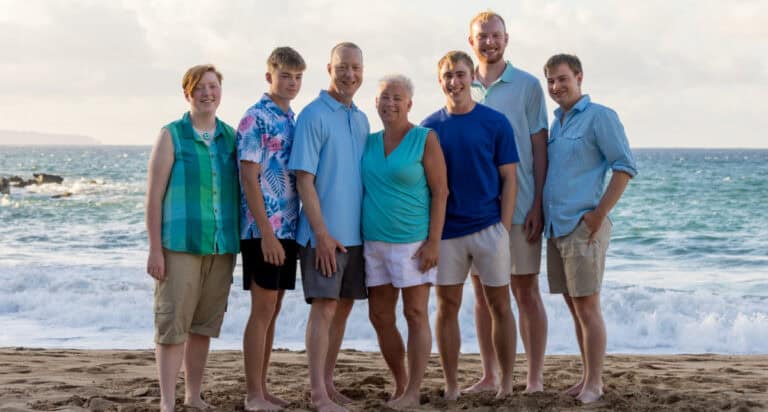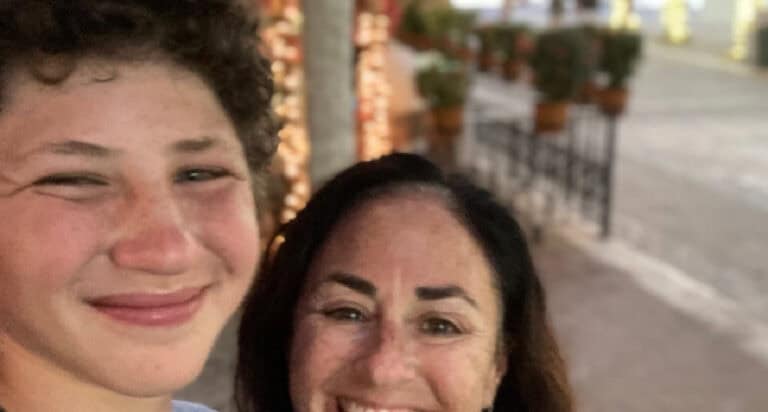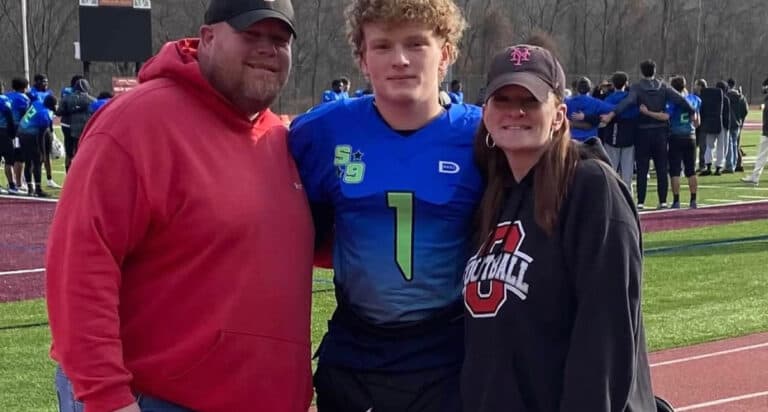When my first child died, I was devastated. I knew that life would never be the same, but what I couldn’t know was all the ways that losing my son would impact the way I parented my remaining children. I think it is common for parents to struggle with survivor guilt when a child passes away, but I felt such culpability for his passing.
This moral injury informed everything, but especially cratered my ability to trust myself to parent well. Parenting in a time of loss is excruciating, and I am not going to say I did it well, but now that I have been parenting for over twenty years without my son, I feel like I have a better sense of how to parent all of my children better.

7 things I did that helped me parent in a time of loss
1. I let the grief come
I used to try to be strong for my kids. I wanted so much to make up for what had happened to Elijah, and I didn’t want them to see their mom being a mess. I’m not saying that we allow the full force of grief to overtake us in front of our kids, but I have learned that giving in to grief is absolutely appropriate.
Even now, so many years after losing Elijah, I take two days a year, his birthday and the anniversary of his passing, to stop the world. The grief has softened in time, but I honor Elijah each year by writing him a letter, moving slowly, just being present with him in my heart. I also don’t hide other areas of grief from my kids. How can they learn to grieve if no one ever models it for them?
In a world that normalizes “pushing through,” I think it’s important for my kids to see that their mom can be” having a pretty big sad” one moment and whipping up stir fry the next. That’s how life is.
Of course now that my kids are older I can be a little more forthright about my own emotions without patronizing them. We need to be careful to protect our kids, but we still need to allow our hearts the honor of aching for the ones we’ve lost.
2. I let the relationship with my son who passed remain
Even though Elijah is not present with me, I started to heal when I decided to remain in relationship with him. I talk to him. I ask him how he is doing. I am still Elijah’s mom, and I like to draw him close— writing him music, or thinking about what he might look like now.
Some of the worst pain of grief is feeling the presence of our loved one’s absence. It’s easier sometimes not to talk about Elijah, but now when people ask me how many kids I have, I say five. And that statement feels true.
Keeping the relationship with Elijah alive in my heart is important for me, but I think it also helps me not to place an undue burden on my children. It’s easy to place our loved ones who passed on a pedestal, enshrining them in some sort of perfectionism that doesn’t represent who they were. I need to let Elijah be the goofy, sweet, rambunctious little boy he was; doing so allows me to see each of my remaining children as the unique magical creatures they are.
3. I let my mortality inform my days
When loss comes, especially traumatic, unexpected loss, the possibility that we are potentially living our last day becomes etched into our psyches. For me, this is not a scary thought any more. Not really. I mean, I don’t sit around contemplating my death all day long, but I do wake up and think, “I am one day closer to my death; how does this inform my life?”
Losing Elijah was originally like a tsunami to my soul. The waves of grief both unmade and re-made me. But, now grief feels like a clarifying force. I parent deliberately and prioritize time with my kids over just about everything. I am keenly aware of our limited time, and so, if a kid wants to hang out, I consider myself a lucky parent and try to make it happen.
4. I parent from gentleness
Yes, I do all the mundane things a parent who hasn’t lost a kid does: The laundry, dishes, and homework merry go round never stops. I am not afraid to step in with structure and set expectations for my kids, but honestly, I do this way less than I used to.
As I have softened, I have become gentler, and I am much more likely to try to get to the root of a behavior than jump into problem solving mode. I believe that this generation of kids is very smart, and they are aware of the complexity of our world in ways that I and my peers were not. Grief has made me aware that everyone is fighting a great battle.
I remember what it was like when simply getting my feet out of bed and onto the floor was a huge win. I have become keenly aware that my kids don’t owe me anything. They didn’t ask to be here. The duty actually runs the other direction. Gentleness and a listening ear were born of having people be gentle with me when I was consumed with sorrow.
My kids deserve nothing less. So, I try to listen with a gentle heart.
5. I don’t try to fix everything for my kids
I joke with my kids: “Don’t you know that as your mom, I want nothing bad to happen to you, ever?” I used to be hypervigilant of my kids after Elijah passed. I can still trend that way to this day (Helloooo, trauma!), but when I am grounded, I remember that usually the best thing I can do when life happens to one of my kids is to simply be there.
I have learned to just say, “I am so here with you right now.” It’s my job to ride the storms with my kids, even if in the back of my mind, I know I am about to spend four hours Googling any practical supports they might need. What a gift I think this is for a child — for a parent to stop their world for a moment and just honor the pain their kid is in. This might be the single biggest thing I can do for my kids. (Okay, a little Uber Eats therapy doesn’t hurt either. Looking at you 20 year old kid).
6. I quickly repair relationship ruptures
I can’t go back with Eliah and undo the events that led to his passing, but I have four remaining children who want to be in relationship with me. Wow. I am lucky. When I misstep with a kid and cause them pain, I am grateful if they want us to repair the rift.
Losing Elijah humbled me. The idea that I would arrive with all the skills I need to perfectly parent four magical creatures is actually pretty messed up. Parenting skills are relationship skills, and I find a good old fashioned, “I am sorry. I messed that up, and I hurt you” goes a long way toward healing.
7. I embrace the joie de vivre, Babyee!
I’ve gotten a lot sillier over the years. I’ve started to gain some perspective that it really is only life after all. Moving through great sorrow has taught me to let the joyful times in.
I live in New Orleans where we have a saying, “Let the good times roll.” We don’t know what hard times may be rolling through, so every moment that feels pregnant for a laugh needs to be embraced. I’ve learned to allow the lows and I have found that in doing so, I found buoyancy of heart.
Nothing will ever make the loss of my son okay
Nothing will ever make it okay that my son is gone. I would have him back in a moment if I could. But, loss can and does co-exist peacefully with fun. I intend to have as much of it as I can with my remaining kids.
Parenting in the wake of my son’s loss is absolutely the hardest thing I have ever done. Some days it feels like I am parenting with half of my heart on the other side of the veil, but, as painful as grief is, I have learned to let it unmake and remake me into this type of mother.
I can hold the fact that I wish Elijah back alongside the fact that his loss made me into a mother who is better for the kids who remain. I will always love that boy, and I will alway try to be the best mom his siblings can have.
I don’t have to push Elijah’s loss away. My grief is a thread that is braided into my entire life, my parenting included. And that’s okay.
More Great Reading:
My Daughter Died from Ewing’s Sarcoma Cancer: What I Learned From Our Devastating Loss









